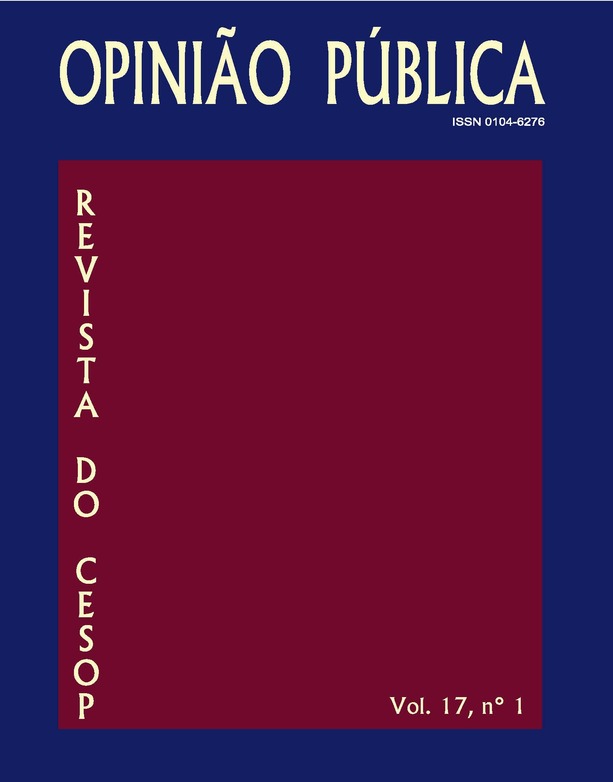Opinião Pública – Vol. 17, Nº 1 2011
Articles in this issue
Author: Oswaldo Amaral
The main aim of this paper is to show that the Workers’ Party (PT) continues to be strongly attached to civil society organizations and capable of attracting members after a series of programmatic and ideological changes in the last 15 years. Through the evaluation of membership and organizational data and also the analysis of surveys conducted among PT’s delegates between 1997 and 2007, we show that the party still has strong connections to civil society organizations and increased significantly its number of members during Lula’s government.
Authors: Octavio Amorim Neto, Bruno Freitas Cortez e Samuel de Abreu Pessoa
This article presents a proposal for an incremental reform of the system of the Chamber of Deputies. The incremental nature of the proposal rests on the assumption that this political system is a complex and delicate architecture, and therefore, abrupt and ambitious changes are more likely to make it worse than to improve it. The proposal advocated here maintains the current system of open-list proportional representation, but it changes two key variables of this electoral system, since it reduces its average district magnitude and establishes a proportional distribution of seats among parties that form electoral coalitions. The way the reform is operationalized leads to a redesign of the electoral map of the country, with smaller districts within 12 states. The article also presents the results of a simulation exercise based on data from the 2006 elections, whereby the party makeup of the Chamber of Deputies is recalculated according to the rules proposed here.
Author: Álvaro Bianchi
The article analyzes the formation years of Political Science in the United States. The bibliography has highlighted three characteristics that would be the core of an American tradition in this study field: 1) the commitment to the principle of liberalism, 2) the institutionalist approach, and 3) the affirmation of the scientific character of its entrepreneurship. In a still little elaborated way, these haracteristics are present in a “citizen literature” in the end of the 18th century, but they were defined in a more precise way in the process of institutionalization of political science in the second half of the 19th century, and has become the hallmarks of this science in the United States. This research shows how these characteristics have been displayed in the emergence of Political Science and argues that for its better understanding it is necessary to highlight a forth characteristic: its mistrust democracy and the people.
Author: Emerson Urizzi Cervi
The article presents a typology for quantitative analysis of mídia content, specifficaly, the Horário Gratuito de Propaganda Eleitoral (HGPE)_ of proportional election`s candidates. There are few studies regarding the content displayed by candidates in local, state and national legislative elections in Brazil, and the content analysis of HGPE for federal deputies in the state of Paraná in 2006 proposes the use of three sets of variables: indexing, semantic and symbolic elements
Author: Sergio Praça
How do institutions foster corruption? How does the unveiling of corruption scandals affect institutional reform? This essay takes the Brazilian budget process from 1988 onwards as a case study in an attempt to answer both these questions. In this period, two corruption scandals in the budget process were uncovered: the “budget dwarves” in 1993-1994 and “budget leeches” in 2006. The first scandal is a classic example of how institutional centralization, coupled with informality, results in corruption; the second scandal illustrates how corrupt actors work within a partially decentralized institutional scenario. Both scandals resulted in partial, and somewhat effective, institutional reforms.
Author: Alexander Cambraia N. Vaz
The paper discusses potential linkages between political participation and the distribution of public goods and services at the local level. It considers a relation between greater participation and a better performance on the offer of public goods by governments by analyzing variables associated to managerial aspects. The study was conduced in eight Brazilian cities.
Author: Ricardo Fabrino Mendonça
This paper aims at outlining a concept of deliberation compatible with the theory of recognition. Despite fostering different bodies of knowledge, these two theoretical perspectives emphasize the emancipatory potential of intersubjective communication. In order to suggest a joint approach, the article challenges four questions that seem to indicate incompatibilities between recognition and deliberation. The paper advocates a deliberative approach marked by: 1) a non-altruist conception of reciprocity; 2) a focus on meta-consensus; 3) a non-cognitive understanding of communicative forms; 4) a broad comprehension of deliberative processes; and 5) an understanding about the importance of civil society associations.
Author: Viviane Petinelli
This paper examines the incorporation of the deliberations of the national conferences into the policy agenda of the Brazilian federal government and suggests aspects that affect the capacity of these public spaces to influence this process. The hypothesis is that the degree of incorporation of each conference, i.e., its inclusive capacity, varies according to the nature of the public policy debated, given that each policy has its own purpose, involves a distinct type of civil society and is formulated by different public institutions. To test this proposition, the article compares the national conferences of aquaculture and fishery, of women and of racial policy. The results corroborate the assumption that conferences of distinct public policies have different inclusive capacity.
